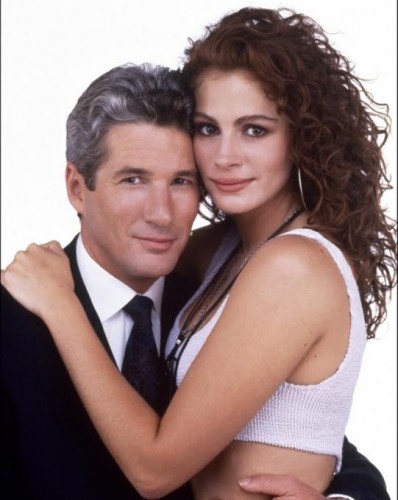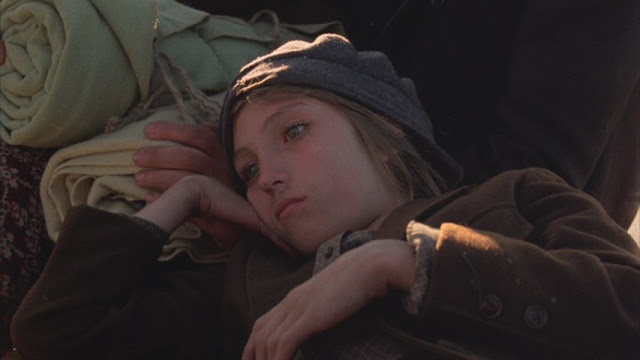This is a guest post by Brigit McCone.
Pretty Woman has already been reviewed negatively by Bitch Flicks as “one of the most misogynist, patriarchal, classist, consumerist, and lookist movies ever to come out of Hollywood” and by sex workers for portraying prostitution unrealistically and romanticizing the patronizing “Captain Save-a-Ho” client’s rescuer fantasy. There is justice to these criticisms, but I would like to examine the film more positively from another angle. Pretty Woman consistently shows greater respect for the bodily autonomy of its heroine, Vivian (Julia Roberts), than most traditional portrayals of romance and most feminist portrayals of prostitution. The debate whether Pretty Woman should be considered a feminist classic cuts to the heart of feminism itself: is it a liberation movement that prioritizes the freedom and agency of women above all, or a dogma that dictates gender roles to women? To explore this question more fully, I’d like to address the most common criticisms leveled at Pretty Woman:
Pretty Woman Glamorizes Prostitution!
It says something about our common perception of sex work that the film most often accused of glamorizing prostitution should open with a “dead hooker in a dumpster,” before our heroine is punched in the face and sexually assaulted by a creep who screams, “She’s a whore, man!” when challenged. Would a film be accused of glamorizing accountancy if it opened with a bankrupted accountant leaping to his death from the upper window of an office block? If anything, Pretty Woman may be accused of glamorizing the exit from prostitution, by making a future of monogamy with a patronizing rescuer-john into an unrealistically attractive option. The glossy, Hollywood production values of the film may glamorize prostitution, but only in the sense that Apocalypse Now glamorizes warfare, or Wall Street glamorizes capitalism. I suspect that those who claim to be disturbed by Pretty Woman‘s “glamorizing” of prostitution are actually more disturbed by these key assertions: that a prostitute is an individual, that prostitution is work comparable to other forms of labor and that abuse of a prostitute is the sole responsibility of the abuser.
Vivian’s individuality is shown in Pretty Woman as she proves stereotypical assumptions wrong. She does not do drugs; her backstory involves some bad relationships but no explicit sexual trauma; her intelligence repeatedly surprises listeners. Arguably, this marks Vivian as the exceptional “tart with a heart” cliché, who deserves to be loved and rescued because she is “special” and “not like the others.” I would argue that the treatment of Kit de Luca complicates this reading. Through Vivian, we are encouraged to sympathize and feel solidarity with Kit, a streetwise prostitute and drug addict. Vivian gives Kit a large sum of money at the end of the film, respecting her right to choose whether to spend it on her drug habit. Vivian never dictates life choices to Kit, only supports her self-esteem and encourages her to regard herself as having potential to define her own dreams. Through Vivian’s attitude to Kit, the viewer is encouraged to extend their respect for Vivian’s agency to the agency and individual potential of all sex workers.
Sex worker advocacy groups have long claimed (and it’s now being discussed by Amnesty International and the World Health Organization) that the most effective way to combat trafficking, abuse, and other hazards of prostitution is by decriminalizing it and recognizing it as work, entitled to the same health and safety protections as any other labour. By repeatedly comparing Vivian’s work as a prostitute with Edward’s (Richard Gere’s) corporate work, Pretty Woman reinforces this message, albeit in cutesy Hollywood style. Vivian’s backstory also notably emphasizes that her reason for becoming a sex worker was her desire for financial autonomy and her struggle to pay rent.
Finally, virtually all cinematic depictions of sexual assaults on sex workers fall into one of two categories: those that pay no attention to the abuser’s character and treat him (almost always “him”) as a faceless “symptom of prostitution,” reinforcing the victim-blaming narrative that the heroine attracted inevitable assault by her choice of profession, or those that center the abuser as an “anti-hero” while treating the sex worker as disposable. Pretty Woman does neither. When Stuckey assaults Vivian at the climax of the film, we are already well-acquainted with both characters and understand the assault as a direct expression of Stuckey’s insecure manhood, repulsive entitlement and poisonous resentments, while the assault’s impact on Vivian is sympathetically centered. By allowing us to know both would-be rapist and intended victim, Pretty Woman succeeds in resisting victim-blaming and suggests that the assault of sex workers is an unjust and inexcusable act that reflects the character of the abuser. For that alone, Pretty Woman should be considered a feminist classic.
Pretty Woman Is Materialist!
As a film in which the monetary value of sex and companionship is negotiated, Pretty Woman is inevitably about materialism. But this does not necessarily mean that it is uncritically materialist. The film makes a point of highlighting how impersonal wealth is: “Stores are never nice to people, they’re nice to credit cards.” Vivian’s famous, triumphant confrontation with the shop assistants – “You work on commission, right? Big mistake!” – might be read as glorifying her newfound superiority as rich woman, but it satisfies because it allows Vivian to confirm that the shop assistants were judging her credit card all along. The scene shows Vivian that her personal worth is irrelevant to society’s hostile treatment of her, building her self-esteem. Since Vivian empowers herself in other scenes by implausibly rejecting cash payment to assert personal worth, this anti-materialist interpretation of her shopping triumph feels correct. Pretty Woman repeatedly highlights ironic contradictions between the performance of wealth and the personal self. Edward performs wealth by purchasing the penthouse as status symbol, but he cannot enjoy it as he’s personally afraid of heights. His elite peers can purchase opera tickets as status symbols, but Vivian can appreciate opera as personal taste – by choosing “La Traviata,” an opera about a sex worker, the film also highlights the ironic contrast between society’s mindless appreciation of sex worker pathos in elite entertainment and their mindless hostility to sex workers in life.
Elements in Pretty Woman satirizing materialism, and exploring the hazards of prostitution, are hangovers from the original script, $3000, in which Vivian was a drug addict and discovered Kit overdosed at the film’s end. That version might seem “edgier,” but is it truly edgy to echo and reinforce society’s dominant narrative of prostitution? By adapting $3000 into a commercial romcom, Disney accidentally spawned something far more challenging: a film in which prostitutes aren’t necessarily doomed, and men are individually responsible for their treatment of them. Wealth, likewise, is not presented as automatically good or bad in the film. It is his over-investment in wealth and status that drives Stuckey to become a vengeful would-be rapist. Money can destroy lives, or build “great, big boats.” Kit’s final choice, whether to spend her “scholarship fund” on her dream or her drug habit, shows that money has empowering potential but is no guarantee of happiness. If Pretty Woman‘s beautiful clothes and jewels distract from this message, that is a reflection of the viewer’s attitude to luxury, not the film’s.
Pretty Woman Is Patriarchal!
There can be few images more patriarchal than a white knight riding up to rescue his (usually comatose) princess, claiming her love as his inevitable reward. This is not, however, the ending of Pretty Woman. Pretty Woman ends with Edward role-playing Vivian’s explicitly requested fantasy, and thereby indicating willingness to comply with the conditions she laid down for their relationship. In fully accepting Vivian as his romantic partner, rather than conditionally accepting her as a mistress or object of pity, Gere echoes the “I like you the way you are, so what do I care how you got that way?” philosophy of Marilyn Monroe’s Bus Stop, another underrated affirmation of the bodily autonomy, emotional complexity, and romantic viability of promiscuous women. Whether we believe Vivian’s “white knight” fantasy is cheesy is besides the point; a film in which a woman explicitly negotiates the terms she wants for her relationship, and displays willingness to pursue her goals independently if those terms aren’t met, cannot be considered patriarchal. Whether we believe Edward is a slime-ball who looks like a peeled prawn in the bathtub is equally irrelevant; female emancipation must include the right to have questionable taste in men, or it is no true freedom. Gere serves here as a metaphor for sex work itself: whether one personally finds him icky should not distract from crucial issues of consent and agency.
Vivian displays her willingness to leave Edward and set boundaries on multiple occasions: when he embarrasses her by outing her sex worker status at a social gathering, she dictates the way she wishes to be treated; when he offers her the status of a mistress, she dictates the status of a full equal. Let us never forget that, when the prince rescues her, she rescues him right back. Pretty Woman should also be celebrated as one of the only romances to include explicit negotiation of condom use, initiated by the female sexual partner. By ultimately suggesting that a sex worker’s ethos of “we say who, we say when, we say how much” is the key to success in romantic relationships, Pretty Woman is deliciously subversive. A romantic “happy ending” only serves patriarchal goals if it is a reward, conditional on female compliance and chastity. If it becomes just an individual dream, that any hooker can define and negotiate for herself, then its coercive power collapses. That is the real reason why conservatives howl about the “glamorizing of prostitution” in Pretty Woman. That is why millions of women love and laugh with Pretty Woman worldwide. That is why Pretty Woman deserves to be considered a feminist classic.
Pretty Woman Is Heterosexist, White Supremacist, and Lookist!
Pretty Woman is about straight, white, conventionally pretty people, but it is not derogatory to other groups. While the film’s villain, Stuckey, is indeed short and balding, and this may fuel his competitive resentment toward Edward, Hector Elizondo’s hotel manager, Barney, is also somewhat balding, yet serves as the moral core of the story. Though nominally a supporting character, Elizondo delivers a master class in creating fully realized humanity with a few brushstrokes – subtly suppressed frustrations and resentments that co-exist with, and complicate, his character’s warmth and dignity, leading to a well-deserved Golden Globe nomination for the role. At the film’s end, an unnamed African-American demands the audience’s recognition for his humanity and dreams, while challenging them to define their own. Pretty Woman certainly marginalizes its minority characters, but it does not dehumanize them. For Hollywood, sadly, that remains a minuscule achievement.
Pretty Woman is not a realistic portrayal of prostitution; it is a Hollywood fairy tale and never claims to be otherwise. At the same time, the values that it embodies as fairy tale are both progressive and feminist: recognition of the agency and bodily autonomy of sex workers; categoric rejection of victim-blaming in assaults on sex workers; positive endorsement of a woman’s negotiating boundaries within romantic relationships; positive endorsement of the romantic potential of promiscuous women as life partners; positive endorsement of personal worth as founded on ethics, independent of wealth, education or sexual history. Pretty Woman is a beautiful freak; an accidental anarchy spawned from commercial compromise. To describe Pretty Woman as “anti-feminist,” or to fail to celebrate its feminism, is to prioritize the sexist surfaces of “whores” and “white knights” over real issues of agency, desire and consent. Big mistake. Big. Huge.
Brigit McCone always thought Vivian should have chosen Barney the hotel manager, but recognizes he’s probably married. She writes and directs short films, radio dramas and “The Erotic Adventures of Vivica” (as Voluptua von Temptitillatrix). Her hobbies include doodling and taking romcoms ridiculously seriously.
















